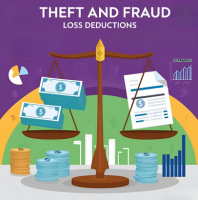Understanding Theft and Fraud Loss Deductions
Guidance from a Fraud Examiner

Reviewed by Jim Marasco, Partner
As a fraud and forensic examiner, I’ve seen firsthand how devastating financial scams can be for individuals and businesses alike. Beyond the immediate financial losses and emotional toll, victims often face complex tax implications. One such challenge stems from the limitations on theft loss deductions under the Tax Cuts and Jobs Act (TCJA). Let me walk you through what this means and how it could apply to your situation.
Theft Loss Deduction Basics
The IRS allows deductions for certain losses not covered by insurance or reimbursement, but the TCJA (2018-2025) put significant restrictions on these deductions, particularly for personal theft losses. Here’s the breakdown:
- Deductible Losses Include:
- Losses incurred in a business
- Losses from transactions entered into for profit (e.g., investments)
- Personal theft or casualty losses (only if arising from a federally declared disaster)
This means that for most victims of scams, deductions are only available if the loss was tied to a profit-seeking transaction. Unfortunately, personal losses unrelated to business or profit—like sending money in a romance scam—are not deductible under current rules.
IRS Clarifications: New Insights on Scam Losses
A recent IRS memo (CCA 202511015) examined several types of scams to determine which losses might qualify for deductions. Here’s an example to illustrate the rules:
Example: Compromised Account Scam
Let’s say you were contacted by someone posing as a representative of your financial institution, warning of suspicious activity. They convinced you to withdraw funds from your IRA and non-IRA accounts and transfer them to “secure” investment accounts. Unbeknownst to you, the funds were funneled into the scammer’s overseas account.
Under the IRS interpretation, the key question is whether the transaction was entered into for profit. In this case, because your intent was to reinvest the funds in similar investment accounts, the loss could qualify as a deduction.
Scenarios to Consider
Here are some common fraud cases and how the IRS evaluates them:
- Investment Scams (“Pig Butchering”): Losses from fraudulent schemes where victims are lured into fake investments can often be deducted, as these transactions are profit-motivated.
- Phishing Scams: If scammers steal funds directly from investment accounts, the losses may be deductible as the accounts are tied to profit-seeking.
- Romance or Kidnapping Scams: Losses in these schemes are typically not deductible because the funds were not intended for investment or profit.
What Should You Do?
If you’ve been a victim of fraud, it’s essential to evaluate whether your loss might qualify for a deduction. While the restrictions under the TCJA are in place through 2025, some victims may still qualify for relief—especially if the loss was tied to a profit-driven transaction.
For example, I recently worked with a client who fell victim to an investment scam. By carefully documenting their intent and the nature of the fraudulent scheme, we were able to amend their prior tax returns to claim the theft loss deduction, helping to offset some of the financial damage.
How I Can Help
If you’re unsure whether your situation qualifies, or if you need help gathering the necessary documentation to prove your claim, let’s talk. Fraud cases are emotionally and financially complex, but with the right guidance, we can take steps to recover what’s possible and ensure your tax filings are accurate.
The tax code is nuanced, especially when it comes to fraud losses, but you don’t have to face it alone. Contact me for assistance—I’m here to help you navigate the process with expertise and care.